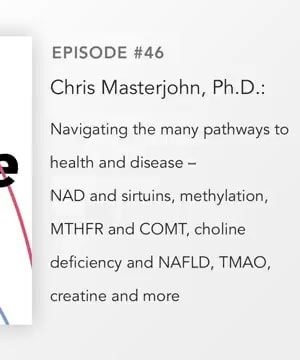Describe the impact of COMT and MTHFR gene mutations with regards to ADHD, autism and other neurological disorders alongside stress perception and focus.
Sources:
The impact of COMT and MTHFR gene mutations on ADHD, autism, and other neurological disorders, as well as stress perception and focus, have been discussed by experts such as , who has extensively studied these genetic variations and their implications on health.
-
MTHFR Mutations: MTHFR plays a critical role in converting folate into its active form, which is essential for various bodily functions, including DNA repair and neurotransmitter synthesis. A mutation like MTHFR C677T can reduce the enzyme's function by up to 70%, leading individuals to require more dietary methylfolate. This is especially crucial for mental health as folate is needed for producing neurotransmitters; deficiencies can contribute to conditions such as depression, OCD, bipolar mood, and emotional disorders. Methylation issues associated with MTHFR mutations can also impact the gut-brain connection, crucial for neurotransmitter production. These neurotransmitter imbalances often stem from improper methylation processes, particularly in the gut 1.
-
COMT Mutations: The COMT gene is involved in breaking down dopamine, a neurotransmitter linked to focus, motivation, and pleasure. Variations of the COMT gene can lead to either higher or lower rates of dopamine metabolism. A faster COMT activity can result in lower dopamine levels, which might contribute to attention issues; however, supplementation with precursors like Tyrosine can help produce dopamine and calm symptoms. Conversely, a slower COMT gene variant can lead to high levels of dopamine and other catecholamines, contributing to traits like being type A, driven, and possibly having higher stress levels. This slower COMT can also lead to longer-lasting responses to stressors. In the context of ADHD, the hyperactivity observed in some individuals may be their way of stimulating dopamine production. The different COMT variants can thus influence how individuals handle stress and focus on tasks 2.
It's important to note that, as explains, there are no specific genes or groups of genes that determine any one condition such as ADHD or autism. Rather, some genes may make an individual more sensitive to the environment, which can influence the presentation of certain traits or conditions depending on the environmental context 3.
While single nucleotide polymorphisms (SNPs) like those in the MTHFR and COMT genes can influence certain biological pathways and tendencies, they are part of a complex interaction between genetics and lifestyle. The presence of a particular SNP does not guarantee the development of a disorder; rather, it may increase sensitivity or predisposition to certain issues under specific environmental or lifestyle factors 4 5.
RELATED QUESTIONS-
What are the most effective known treatments for people possessing both gene mutations, considering the complications around Vitamin B12 supplementation.
Sources:
The treatment for individuals with COMT and MTHFR gene mutations, with complications around Vitamin B12 supplementation, involves a nuanced approach that considers the entire methylation process and the individual's unique genetic makeup. Here are some treatment considerations discussed by experts:
-
Methyl Donors: It is important to consider the balance of methyl donors such as methylcobalamin (a form of vitamin B12) and methyl folate. These support the methylation cycle, help reduce homocysteine levels, and may be beneficial for individuals with MTHFR and COMT mutations. However, their use should be carefully considered, especially in the presence of COMT mutations which affect the breakdown of neurotransmitters like dopamine and norepinephrine 1.
-
SAM-e: Supplementing with SAM-e might improve enzyme function for those with slower COMT activity. However, caution is advised as SAM-e can increase homocysteine and negatively impact individuals if there are other methylation blocks or deficiencies in B12, methylfolate, or magnesium 2. It's important not to reach for SAM-e first but to instead focus on balancing the methylation process through a combination of nutrients and lifestyle interventions 3.
-
Hydroxycobalamin: Instead of directly using methylcobalamin, which might exacerbate symptoms in someone with a fast COMT mutation, hydroxycobalamin can be a useful alternative as it requires methylation to convert into methylcobalamin. This process may be less likely to overwhelm someone with COMT mutation and supports the methylation cycle at a more gradual pace 1.
-
Lifestyle Factors: Addressing lifestyle factors is crucial before focusing on methylation supplements. Diet, stress management, and adequate sleep play a significant role in neurotransmitter balance and can impact levels of epinephrine, norepinephrine, and estrogen 2.
-
Other Nutrients: Individuals with methylation difficulties may benefit from a comprehensive approach that ensures adequate intake of other co-factors, such as magnesium, which support enzyme function 3.
Dr. , an expert in the field, notes the importance of recognizing that methylation and genetics are complex, and there is a need to move beyond oversimplifications. Clinicians should tailor interventions to the individual, ensuring all methylation donors are available and that lifestyle measures are in place 1 2.
Because the information from the cited clips is older than 12 months, it's crucial to note the discussion on this topic might have evolved. It may be beneficial to look for more recently-published research or expert insights to consider any updates in the recommendations for treating individuals with COMT and MTHFR gene mutations.
RELATED QUESTIONS-
Summarize Methylation, Fat Adaptation & Your Metabolism w/ Ben Lynch, ND
In the episode "Methylation, Fat Adaptation & Your Metabolism w/ Ben Lynch, ND" from the podcast, , a renowned expert in the field of epigenetics and methylation, discusses various crucial topics related to optimizing one's biology and health. Here are the key points covered:
- Optimizing Metabolism: Dr. Lynch stresses the importance of understanding how methylation, a biochemical process, plays a role in metabolism and overall health.
- Understanding Methylation: An explanation of methylation and its significance in biological processes, including gene regulation and neurotransmitter balance.
- Boosting Fat Adaptation: The episode explores ways to improve the body's ability to use fat for energy, which is beneficial for metabolism and may influence weight management.
- Neurotransmitter Imbalance: Discussion on how methylation issues can lead to imbalances in neurotransmitters, potentially affecting mental health and cognitive functions.
- Importance of Leafy Greens and Avoiding Folic Acid: Dr. Lynch advises against taking folic acid and highlights the importance of leafy greens in the diet.
- Detoxification and Glutathione: The episode delves into the role of methylation in cellular detoxification and the production of glutathione, a key antioxidant.
- Genetic Considerations: The conversation includes insights on how genetic variations can impact hormone metabolism and unraveling the complexity of genetic influence on health.
- Practical Advice: Dr. Lynch provides actionable tips on customizing one's diet for optimal health, considering genetic variations, and enhancing fat adaptation.
The topics are explored with the intention of helping listeners understand how to better optimize their health through diet, lifestyle, and awareness of their genetic predispositions.
Please note that the discussion in this episode took place on January 28, 2018, and new developments in the field may have occurred since then. Always consult with a healthcare professional for the most updated advice and treatment options based on your individual circumstances.
RELATED QUESTIONS





